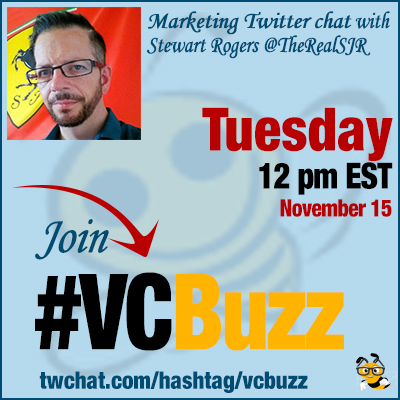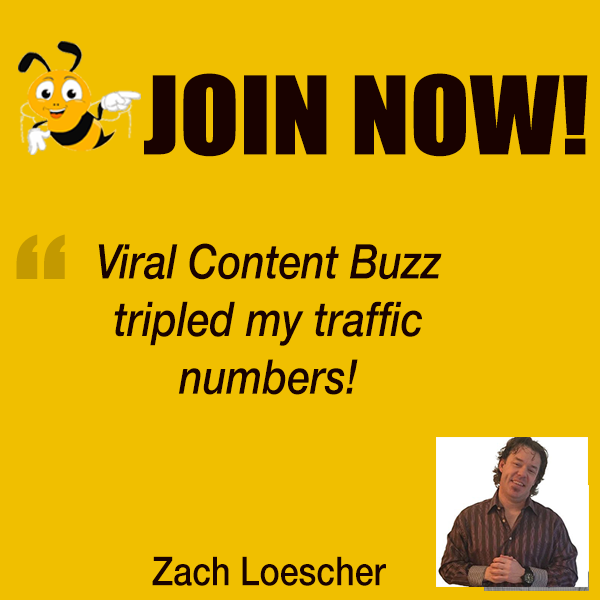 Digital journalism is one of the most exciting phenomena of our times. What is it? Let’s find out today!
Digital journalism is one of the most exciting phenomena of our times. What is it? Let’s find out today!
***Add #VCBuzz chats to your calendar here.
***Please sign in here to follow the chat -> twchat.com/hashtag/vcbuzz
About Stewart
Stewart Rogers @TheRealSJR is the UK based journalist, analyst and speaker. He is director at VB Insight and contributor to VentureBeat
Stewart is also founder of a number of news websites that give all revenues to charity.
Questions we discussed
Q1 In your author byline you say that you’ve been involved in sales and marketing for ages… When did that all start? What’s your career path?
I’ve had an unconventional route. I started as a developer, not a salesperson. However… I started developing custom software to sell with PCs. Where everyone was making 10% gross profit, I was making 400%.
That led to a few people taking notice, and I shifted into sales quite naturally. At 21, I ran my first software co.
I did have a short stint (3.5 years) as an IT Manager, but the rest of my career was sales/marketing/management focused.
A big topic for digital journalism is legitimacy and accuracy of news sources. How does our guest address this in his work? #vcbuzz
— Dave Taylor (@DaveTaylor) November 15, 2016
That includes solid (but fast) fact-checking – being able to sort real from fake is important
Q2 What is digital journalism? How did it change the journalism in general?
Simply put, digital journalism is where we distribute editorial content via the internet, rather than broadcast/print.
In the case of VentureBeat, we cover the tech industry, and what it means to our daily lives.
The changes? It is much easier to reach a wider audience much faster than traditional means, which is a blessing/curse.
Blessing in that you can cover the news instantly, and distribute it widely, without having to wait for distribution. Curse, in that you can fail fast too, and if you’re not among the first to cover, Google will bury you in the results. Speed, therefore, is an issue, because you still want to cover all sides of the story. It’s a balancing act…
A2. Many can use #instagram as a storytelling platform to showcase what is going on in their community and be a digital journalist #vcbuzz
— Cheval John (@chevd80) November 15, 2016
Q3 Can just anyone become a digital journalist these days? Do you need a degree? A certain type of personality? Is it a career worth pursuing?
I’m not sure it is for everyone. There’s quite a big difference between blogging and journalism, for example, first and foremost, you need to be completely cognizant of your own language and have perfect grammar/spelling. You also need to be able to look at every side of a story, not just one or two.
Question everything. Questions are super-important. I augment most articles with quotes from execs at the company I’m covering.
It makes the article unique. What I don’t do is copy and paste press releases. And I’m careful what I cover too.
I used to blog, and blogging is a good opportunity to write an opinion piece. There are exceptions, but typically… blogs are more one-sided than articles. Nothing wrong with that of course.
A3. To be an effective journalist, you have to do your research on the facts and you have to have at least two sources in ur story #vcbuzz
— Cheval John (@chevd80) November 15, 2016
Q4 What are the most efficient ways and tools to monitor news online?
I use a combination of tools, but also being a journalist means I sometimes don’t have to use them!
Because I’m a journalist, and because my profile is out there for everyone to see, I receive pitches all day. And because I’m nice to PR people and I explain how to work with me, and what to pitch, I get news well in advance. Typically, I’ll know what is coming 7-10 days ahead of it breaking to the public, which helps me write and prepare.
However, there are lots of times I need to be able to react to something I’ve not been pitched prior to launch. For those times, I’ll use tools like @Feedly, @Nuzzel, @HackerNews, various Google Alerts (yes, still) and more.
We also track various blogs – sometimes Google and others don’t announce in advance, and you find out via its blog.
Finally, I’ll go to a few tech events each year, mostly as a speaker, but will cover breaking news from each conference. That means that if you run conferences, ensure there is real “hard news” at your event, and give the press a heads-up. It will ensure that the media you invite are more likely to come along. If there is no fresh news, we’ll likely pass.
A4 Case in point #VCBuzz – here’s my latest with quotes from an exec, gathered in a live interview at Web Summit last week https://t.co/uChF6emRRU
— Stewart Rogers (@TheRealSJR) November 15, 2016
Q5 You write so much! What are your productivity secrets?
I confess – I do write a LOT. On average, 28k words per week across articles, reports (I’m also an analyst) and emails. My “best” week since I started tracking? 47k words.
On the plus side, I have a lucrative side-gig as an International diamond thief, because I’ve worn away my fingerprints.
How do I do it? Great processes, and great tools. I use @SaneBox to keep my inbox to just the important emails. I single-task (typically). I create time blocks in my calendar, and I stick to them. I book meetings with myself.
I type fast, but that’s because I’ve been typing since I was six years old. You don’t want to see my handwriting. ? I automate and/or outsource as much as possible. For example, I have people book time in my schedule using @Calendly.
And I have canned responses for those times I receive off-topic pitches, or can’t take a story, using Gorgias in Chrome. The strive to automate and/or outsource as much as possible came from @tferriss‘ 4-Hour Work Week book.
In addition, I’m clear on my rules with those that pitch to me. I don’t typically do briefings for background purposes.
I’ll ask for video of a product/service in use, instead of a live screenshare. I’ll send Q&A via email. All of these add up to help me save wasteful time, and focus energy on reading, understanding, questioning, writing.
Because I’m also an analyst, I’m gathering data constantly to help understand current trends. That helps me to add color to the story, and include data and information others don’t have access to.
RT @vcbuzz: Tools from today: @Feedly @Nuzzel @HackerNews @SaneBox @Calendly #vcbuzz
— Stewart Rogers (@TheRealSJR) November 15, 2016
Our previous writing chats:
- How to Take Your Writing Work Further with Ali Luke @aliventures
- Writing to Impress: Content Marketing Twitter Chat with Don Sturgill @DonSturgill
- Freelance Writing Twitter Chat with Laura Spencer @TXWriter
- Earn Your Living by Doing What You Love: Writing. Twitter Chat with @SHurleyHall
- Writing Productivity Twitter chat with Diana Adams @adamsconsulting
- Is There a Work-Life Balance? with Katy Blevins @chaosandkiddos


Leave a Reply